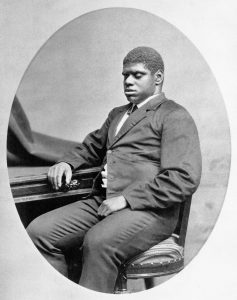by Associate Professor Clara Yang
 Thomas “Blind Tom” Wiggins was a virtuosic pianist, gifted composer, and one of the most in-demand musicians of his time in America in the late 19th century. Born in 1849 into slavery in Columbus, Georgia, he was blind and autistic. People quickly discovered that he had an unusual gift for music from an early age. He was able to perform any musical piece to its entirety with little effort and amassed a repertoire of thousands of pieces over his lifetime. He began touring the United States at the age of eight and at the age of ten became the first Black musician to give a headline performance at the White House (for then-President James Buchanan). Being autistic and Black, he was unknowingly exploited by his owners, wards, and concert promoters for his gifts at every turn and thus toured the United States as a pianist until 1904. Over the course of his life, he became a household name and many famous writers such as Mark Twain and John Steinbeck attended his concerts and chronicled his persona. His published compositions embody 19th-century romanticism with a wide range of emotion and narrative detail.
Thomas “Blind Tom” Wiggins was a virtuosic pianist, gifted composer, and one of the most in-demand musicians of his time in America in the late 19th century. Born in 1849 into slavery in Columbus, Georgia, he was blind and autistic. People quickly discovered that he had an unusual gift for music from an early age. He was able to perform any musical piece to its entirety with little effort and amassed a repertoire of thousands of pieces over his lifetime. He began touring the United States at the age of eight and at the age of ten became the first Black musician to give a headline performance at the White House (for then-President James Buchanan). Being autistic and Black, he was unknowingly exploited by his owners, wards, and concert promoters for his gifts at every turn and thus toured the United States as a pianist until 1904. Over the course of his life, he became a household name and many famous writers such as Mark Twain and John Steinbeck attended his concerts and chronicled his persona. His published compositions embody 19th-century romanticism with a wide range of emotion and narrative detail.
Further Reading and Viewing:
From the video description: “My greatest-grandfather was the first African-American to perform at the White House. Not only was he blind, but he was autistic. He is referenced as the 167 most famous autistic person in the world; Throughout his life, he toured Great Britain, Scotland, Europe, Canada, the Rocky Mountain states, the far West, and South America. By 1861, my greatest-grandfather was giving prestigious performances such as one in Washington, D.C. for the first Japanese diplomats to visit the United States. He performed for the likes of Mark Twain and he earned his slave owners a fortune of $750,000, bringing home $50,000 per year – in which reports claim that he gave it all to charity. Charity being his owners…. -Teisha Dynell Wiggins”
Deirdre O’Connell, The Ballad of Blind Tom (Woodstock, N.Y.: Overlook Press, 2009). https://catalog.lib.unc.edu/catalog/UNCb5948519
The Ballad of Blind Tom, website. http://www.blindtom.org/
Golden slippers. Composed by Blind Tom. [United States: s.n., between 1865 and 1887] https://catalog.lib.unc.edu/catalog/UNCb6256411 [broadside]
John Ryan Seawright, “Blind Tom Wiggins,” in The Oxford American Book of Great Music Writing, ed. Marc Smirnoff (Fayetteville: University of Arkansas Press, 2008). https://catalog.lib.unc.edu/?utf8=%E2%9C%93&search_field=title&q=%22The+Oxford+American+book+of+great+music+writing%22
Simpson, Rob. “Thomas “Blind Tom” Wiggins (1849-1908).” New Georgia Encyclopedia. 09 July 2018. Web. 10 September 2020. https://www.georgiaencyclopedia.org/articles/arts-culture/thomas-blind-tom-wiggins-1849-1908
Thomas Bethune/Thomas Wiggins/Blind Tom Collection. Columbus State University. https://archives.columbusstate.edu/findingaids/mc169.php
